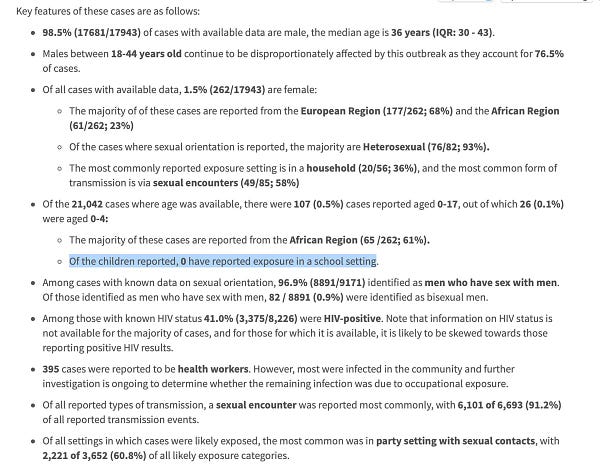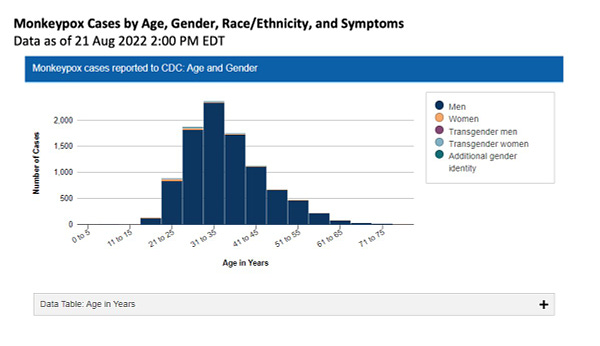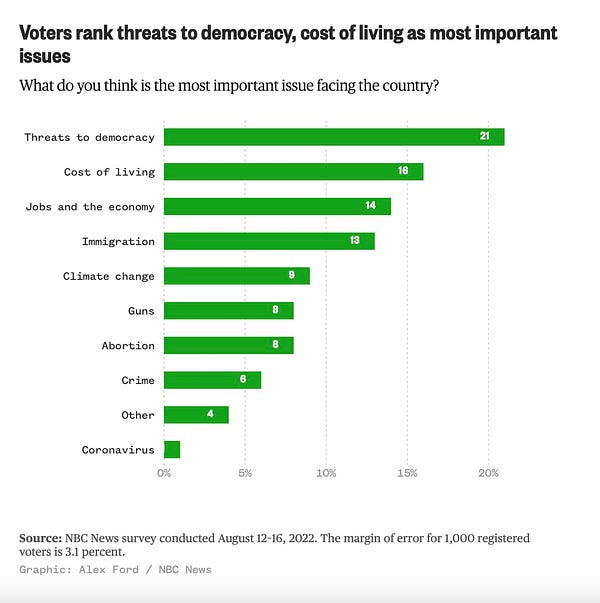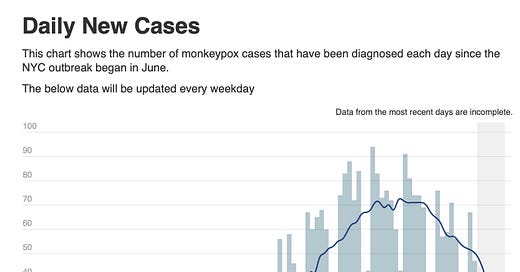Finally, Some Good News About Monkeypox
Cases are declining in key areas, but the media is still fearmongering about kids. Plus: No, "threats to democracy" is not voters' top issue this fall.
Dear readers,
I want to start the week by flagging some positive news about monkeypox: Case counts appear to be declining in key jurisdictions including New York City and Los Angeles County.
Here’s a chart from New York City’s health department, showing that the daily rate of diagnoses peaked near the end of July (but please disregard data in the gray-shaded zone from the last week, which is incomplete):
The peak in LA looks to have been a little later, in early August. And we’re seeing this pattern abroad, too: cases are falling in the UK, in Germany, and in parts of Canada.
Now of course, that cases have been falling does not mean they can’t go back up. But this is a positive sign that efforts to combat monkeypox may be having desired effects. One likely reason is a substantial level of vaccination — New York City says it has administered more than 63,000 doses, virtually all of them first doses, to city residents, while the city’s estimate of the number of residents who are core candidates for vaccination1 is 134,000. And another is behavior change — it’s obviously hard to measure in real time, but the CDC is touting a survey of gay and bisexual men conducted earlier this month in which about half of respondents said they had adjusted their sexual behavior due to monkeypox.
Meanwhile, we are still not seeing signs that there is substantial or sustained monkeypox transmission through channels other than sex between men. Yes, monkeypox can be transmitted through non-sexual contact in households and in the community, and occasionally it is. But this is an unlikely way for the disease to spread, and apparently not an efficient enough mode of spread to support a sustained outbreak. As a result, it continues to be the case that an overwhelming majority of cases are in men, especially between the ages of 20 and 55, with few cases in seniors or women.
In particular, cases in children have been extremely rare, as Benjamin Ryan notes in his typically helpful roundup of the data:






So I’ve been displeased to see some news coverage that treats monkeypox as a significant risk to schoolchildren.
New York Magazine ran a bizarre and irresponsible piece, criticizing New York City public schools for failing to present a plan to stop monkeypox from spreading in schools.2 The article reminds readers that a day-care worker in Illinois was diagnosed with monkeypox last month and “may have exposed as many as 50 people,” a story that received somewhat breathless national news coverage at the time; the author neglects to note that, to date, there is no indication that any of those people, adult or child, has contracted monkeypox.
By the end of the article, it becomes clear: Monkeypox is simply providing another opportunity for some COVID fanatics to re-litigate the question of whether it’s important for children to be in school.
Here’s an example of that from the article.
As the school system continues to cut back on its COVID protocols — New York City recently scrapped its requirement for weekly PCR tests and daily health checks — [second-grade teacher Sarah] Allen is not optimistic that the city’s monkeypox response will prioritize safety for her and her students. “With de Blasio and now definitely with Eric Adams, the mayor’s priority has been keeping kids in school for economic reasons, keeping everybody at work and trying to get people back to the office. So I think he’s going to fight any reason that kids would ever isolate again.”
That leaves her no option but to prepare to “tough it out,” she said. “God forbid, I just hope it stays away from children, but it just doesn’t seem like there’s any reason that it will.”
The New York Times ran a piece last week that is somewhat better, called “How to Protect Against Monkeypox as School Starts.” Despite the headline that inaccurately implies there is increased risk once school resumes, at least this article says right at the top that “experts say children are not at a high risk of infection.” Yet the article runs over 2,000 words with extensive recommendations, even though parents really do not need to do anything about protecting their children from the extremely remote risk of monkeypox unless those parents themselves are at significant risk of catching it, which the vast majority are not.
At one point the Times even notes that “many pandemic precautions and behaviors can be repurposed to protect children against monkeypox” including “wearing masks in crowded indoor areas.” If you want to continue wearing masks to reduce your risk of getting airborne diseases or COVID, that’s up to you, but the idea that one would wear masks out of concern for monkeypox makes no sense and only serves as an excuse to continue masking regimes indefinitely.
As I’ve written before (actually on several occasions now, because I keep seeing it!), there are two big problems with the euphemistic “anyone can get monkeypox” framing in so much public health messaging and media coverage. One is that it understates the specific monkeypox threat facing gay men, some of whom are not plugged into the whisper networks and gay-specific media sources where you can find clearer and more accurate information, including from some public health departments. But the other is that it needlessly freaks other people out about the possibility that they and their children might get sick. Parents have enough to worry about and shouldn’t be treating monkeypox as a significant back-to-school concern.
Push poll. I’m annoyed about this poll that NBC News published last week, which they say “finds that ‘threats to democracy’ has overtaken the ‘cost of living’ as the most important issue facing the country.”3

Except this is a terrible poll, designed to mislead rather than inform — to produce a result that allows NBC News to tell their audience that the top issue in the upcoming election just happens to be the subject of obsessive coverage on their air.
What’s wrong with the poll? First, check out this chart of responses:



When I say there are three big things wrong with the question, here’s what I mean:
It arbitrarily breaks “cost of living” and “jobs and the economy” into separate issues — as a result, “threats to democracy” can win with 21% even though those two related concepts combine for 30%.
It specifies the existence of “threats” regarding issues related to democracy but doesn’t specify a "threat” in any of the other issues — for example, respondents could choose “guns” or “abortion,” but not “the threat of gun violence” or “threats to abortion rights.” In May, NBC used more neutral wording, asking instead about “voting rights and election integrity” and found that only 12% of respondents selected that option.
It does not specify the nature of the threats to democracy — it’s likely that many of the respondents saying they’re worried about “threats to democracy” mean “Biden will steal the next election, too.” That’s not a problem with the question design itself, but it is a problem with using the result to validate a January 6- or voting policy-centric approach to the campaign.
If you actually want to understand what’s eating at voters, you should use Gallup’s “most important problem” question, which has comparable month-by-month data and uses an open-ended question — voters name their beef, instead of picking it off a list. In the July survey, just one percent of respondents named issues related to elections or election reform, though I can imagine some answers that Gallup might code as “the government/poor leadership,” which got 17%, that would amount to concerns about democracy. Economic issues were the top concern for 35% of respondents in July, with a majority of those citing high prices or cost of living as a specific concern.
The reason the NBC question bothers me is I don’t want Democrats to get self-indulgent or lose sight of the ground this election is being fought on. Inflation is the number one issue in politics this year, with abortion also having risen to the fore. Since the Dobbs decision, there’s been a sharp rise in Gallup’s data in respondents naming issues related to abortion or the courts as the most important problem in America. Those are the issues where Democrats need to fight and win. The idea that MSNBC-style paeans to “democracy” will save the party remains foolish.
Very seriously,
Josh
Which is to say, men who have sex with men and transgender, gender non-conforming, and non-binary New Yorkers with 2 or more sexual partners in the past 12 months.
The strange premise of a lot of this coverage is that the reason we’re not seeing pediatric cases in any significant number is that children are not in school for the summer. Well, what do people think children do in the summer? They are already in congregate settings like day cares and summer camps, including that one day care in Illinois, and that has not led to outbreaks fueled by transmission between children or from adult staff to children. And as Ryan notes, the World Health Organization has counted zero pediatric monkeypox cases with a reported exposure in a school setting, globally, even as school has been in session in other parts of the world.
As you can see, this alleged finding was catnip for resistance libs: Michael Beschloss tweeted it out and got over 13,000 retweets and 65,000 likes.





Ok Josh, you need to replace Joe Kernen when he retires from “Squawk Box”. ( I’m at my parents, and CNBC is ALL my Dad watches.) Was reading VS, you’d be great. 👍🏻
I feel like the coverage of Monkeypox always tried to treat it in the same vein as COVID. Of course this is odd, as the two are nothing alike, but I feel that same sense of panic-porn that was present early on with COVID.
In there vein it’s worth noting that media coverage was TERRIBLE with COVID early on, careening between COVID being overblown beyond belief and it being the Black Plague. Maybe the fearmongers were just as bad then as they are now, and perhaps they simply got “lucky” that COVID actually was a worst case scenario.
Either way, I just feel the Monkeypox coverage is a last attempt at relevance from a medical community that doesn’t want to admit people have moved on and doesn’t want to waste their day hearing about how this new disease is going to turn our world into “The Stand.”